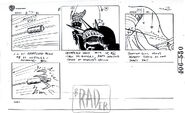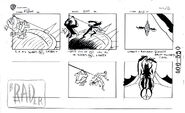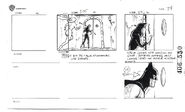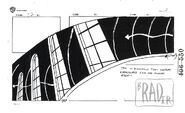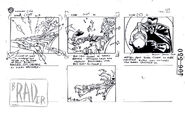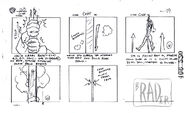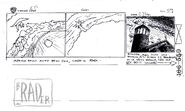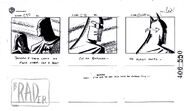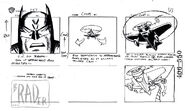"Off Balance" is the forty-fourth episode of Batman: The Animated Series. It originally aired on November 23, 1992.
Plot[]
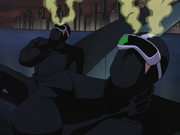
Thugs from the Society of Shadows silence themselves.
Batman meets one of his underworld informants, Twitch, atop Gotham's Statue of Freedom.[1] Twitch says he's been running errands for a mysterious organization, the Society of Shadows. He mentions that they are planning a heist of a high-tech weapon, and their leader goes by the name "Vertigo". Just then, two agents of the Society appear and attack. In the fight, Twitch is thrown off the statue's head into the sea (though he appears to survive). Batman overcomes the two agents, but before he can interrogate them, they release gas canisters in their masks, sending them both into catatonic states.
Batman appears at the firing range at Gotham Police Headquarters, where Gordon is practicing alone. Batman relates the night's events, but then guesses that the target of the planned heist is Wayne Enterprises' new ultrasonic drill, being delivered that night by train.
At the rail station, when the drill is unloaded, Lucius Fox and the entire security detail are disabled by waves of vertigo, caused by waves emitted by an eyepatch worn by Vertigo himself. As his men take the drill, Batman appears and tries to intervene, but is likewise disoriented by the vertigo effect. Vertigo is about to attack, but a dart is fired before him. He turns and sees a mysterious woman aiming another shot at him, and flees with the drill.
Batman tracks the Society to an abandoned cathedral outside Gotham. While searching the surrounding forest, he runs into the woman, who introduces herself as Talia. Then they are both attacked by the Society. Talia proves herself more than capable in combat, and they have gained the upper hand when two more agents appear above them and fire the drill at them. The ground crumbles beneath their feet, dropping them into an underground cavern and knocking them unconscious.
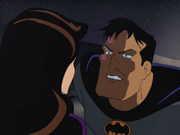
They wake up in a cell. Batman finds that Talia has removed his mask to care for his wounds. She explains that Vertigo used to be a servant of her father, who sent her to punish him. She proposes a temporary partnership.
Batman manages to open their cell door, and they make their way into the main hallway. As soon as they enter, the door seals behind them, and the vertigo effect hits them. At the other end of the room, Vertigo explains that he's making his departure, but he's planted identical devices in the walls which will continue the effect after he leaves, and thus make it impossible for them to avoid the room's booby traps.
Batman takes Talia's arm and asks her to trust him. They make their way slowly across the room, narrowly avoiding booby traps such as trap doors and arrows, with his guidance. When they reach the other end, they pass through a door and the vertigo effect stops. When Talia asks how he resisted the effect, Batman says he kept his eyes closed, relying instead on his hearing and other senses.
They climb the stairs of the bell tower as Vertigo is carrying the drill to a helicopter on top. Seeing them, he activates his vertigo device, throwing them off balance, then fires the drill, tearing away the stone steps. Unable to stop from falling, both Batman and Talia jump forward and grab the bell ropes. In the belfry, the bells issue a thunderous ringing, causing Vertigo to drop the drill and stumble, with his hands pressed to his ears. He tumbles out of the tower, falling into a nearby river.
Batman carries the drill back towards the Batwing, telling Talia that both their jobs are done. She says, not quite, and points her gun at him. At her order, he hands over the drill, but not before slipping a small device into its barrel. As a helicopter lands to lift Talia off, Batman vows that their business is not yet settled.
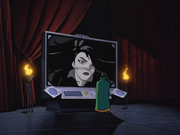
Talia and a mysterious man speak.
As the helicopter flies over the mountains, Talia informs her father via videophone that she has succeeded. He congratulates her and suggests that she test the drill. She aims the drill out the window at a nearby mountain and pulls the trigger—then the concealed device explodes, causing the weapon to short-circuit and overheat, forcing her to drop it. As she rages over the phone, her father coolly shuts off the line impressed that Batman achieved a victory even in defeat. He also vows that their business with Batman isn't settled.
Continuity[]
- Batman's brief encounter with Talia seems to have tremendously impressed both her and Ra's; by the time of their next appearance, "The Demon's Quest", Ra's has set in motion an elaborate scheme to test Batman's worthiness as the heir to his empire and the husband to his daughter.
Background information[]
Home video releases[]
- Batman: The Animated Series, Volume Two (DVD)
- Batman: The Complete Animated Series (DVD)
- Best of Batman (DVD)
- Batman: The Complete Animated Series (Blu-ray)
Production notes[]
- This episode went through several different retakes, according to Bruce Timm. "The distortion vertigo sequences weren't disorienting enough so we did retakes. While we were waiting for them, we did effects in video with a computer that were real wobbly and quite nauseating. It worked great, but we did that just to get the show on the air. When we got the retakes back, the film editors cut them into the episode, but dropped the video distortion effects on the whole sequence and that ran. We told them to put the effects back in, which is the version now airing."[2]
- Due to scheduling, storyboard artist Brad Rader was working ahead of the design crew by a couple weeks. As a result, Rader used the Statue of Liberty directly in the storyboards without doing anything to alter it. This drew ire from background designer Ted Blackman, who felt he was ham-strung aesthetically.[3]
- Bruce Timm has mentioned that Twitch's appearance bears a passing resemblance to Tim Burton.[2] However, since Rader was working ahead of the character designers, he designed Twitch during the storyboard process based off of Dustin Hoffman's portrayal of Ratso in 1969's "Midnight Cowboy".[4]
- Unusual to his style at the time, Rader inked his storyboard pages for this episode as he was "starting to find rendering black areas with pencil annoyingly time consuming."[4]
- Rader initially storyboarded Twitch to be swept under by a wave after being thrown from the statue. However, BS&P deemed this too violent.[5]
- Rader has stated that keeping Talia's introduction in act one "mysterious" was inspired by Indiana Jones' intro in Raiders of the Lost Ark.[6]
- As Rader was working ahead of the background artists, he designed Vertigo's lab referencing images of James Whale's Frankenstein.[7]
- This episode was highly inspired by Alfred Hitchcock. While this may be most evident in the villain's name[8] and climax set in a clock tower,[2] Rader has noted turning to Hitchcock's meditations on P.O.V. and audience identification for inspiration when figuring out how to visually communicate Batman overcome the vertigo effect by keeping his eyes closed and using his other senses. This led to the solution of staging the scene from Talia's point of view, allowing Rader to shoot Batman from slightly behind, keeping his closed eyes out of view without being obvious about it[9] as well as blocking the audience's view of Batman's face by keeping Talia to Batman's right.[10]
- Furthermore, Rader has stated that the way he approached his storyboards in Act III was highly inspired by Alfred Hitchcock's “editing in the camera” technique, in which "over footage" would be deliberately left out so there would be nothing for anyone else to play with in the editing bay. This is perhaps most notable in Scenes C34 and C35 (Act III Pg. 29 & 30, seen in the storyboards below) where Talia's sentence is cut and distributed across separate pages.[11] However, much to Rader's chagrin, the dialogue wasn't cut between shots as intended.[12]
- Rader has also stated scenes C74 and C75 from act III (seen in the storyboards below) were directly swiped from the 1958 film Vertigo.[8]
- According to Rader, this episode was storyboarded in three weeks, which was the typical turn-around for the show.[13]
- Rader has cited that storyboarding this episode is what made him a fan of Jack Kirby as an artist, who ended up being a major influence for the sequence where Batman catches Vertigo's sonic drilling, specifically noting an attempt to emulate his simplicity, facility, speed, energy, exaggeration, and abstractness.[14]
Production gallery[]
Storyboards[]
Act One[]
Act Two[]
Act Three[]
Production inconsistencies[]
- Just before Talia is attacked in the forest when she's walking towards the rocks, her walking animation is her stepping forwards, yet she seems to "slide" sideways.
Trivia[]
- Brad Rader has stated he's "pretty sure" Bruce Timm based the design for Talia off of Charlotte Rampling.[15]
- Another homage to Hitchcock is the opening fall from the Statue of Liberty, which resembles a climactic scene from Hitchcock's Saboteur.
- The episode is directly based on the comics story "Batman: Into the Den of the Death-Dealers" (Detective Comics #411, May 1971) by Dennis O'Neil, chronicling the first meeting of Talia and Batman.
- Vertigo's comics counterpart is known as Count Vertigo, an old Green Arrow villain. He also appears in the non-DCAU adaptation The Batman, where his eyepiece affects the ears rather than the eyes. In both versions, Batman counteracts the effects by temporarily disabling the afflicted sense.
- This episode is noteworthy for being the first-ever screen appearance of Ra's al Ghul, one of Batman's deadliest enemies from the comics. Ra's had never before appeared on a Batman film or television show, and would not appear outside the DCAU until the 2005 film Batman Begins.
- Though he is named in the credits, Ra's al Ghul does not formally make his name known until "The Demon's Quest".
Cast[]
Quotes[]
Shadow Agent: May the Shadows live forever. |
Talia: (noticing a rat) Filthy creature. |
Batman: I don't do helpless. |
Talia: How did you do that? |
Ra's al Ghul: So even in defeat, the Detective manages to achieve some small measure of victory. As you said, Detective..."This is not over". |
References[]
|

























